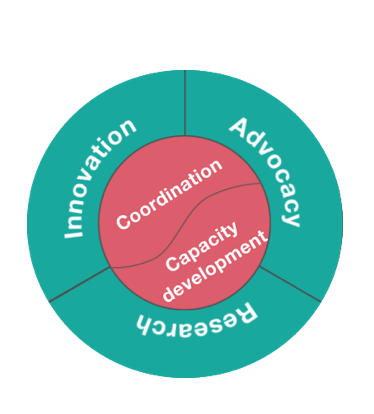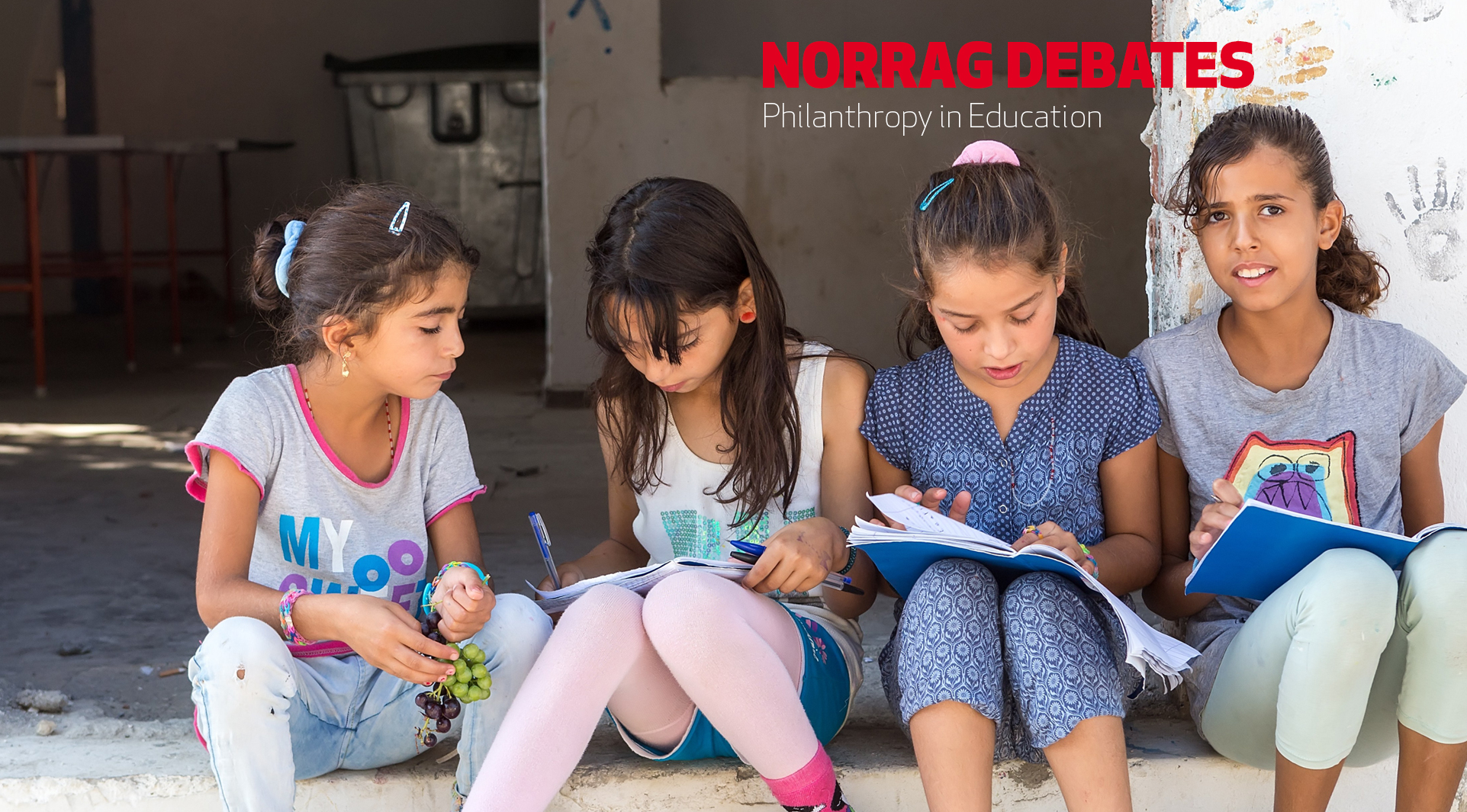What Role Should Philanthropy Play in the Education of Syrian Children in Turkey?
This blog post forms part of the NORRAG Debates stream on the role of Philanthropy in Education (PiE) and carries on from the paper presented by Dr. Aysel Madra at the Inaugural Symposium on Philanthropy in Education: Global Trends, Regional Differences and Diverse Perspectives held in Geneva on 22-24 November 2017. This post is largely based on a web report titled Building Community through Inclusive Education published by the Education Reform Initiative which is also co-authored by Dr. Madra. The report and blog post focus on the need for an inclusive approach to education in Turkey for both native and refugee children, and the important role philanthropy can play in funding, advocacy and coordination. Aysel Madra works as a Policy Analyst at Education Reform Initiative and is based in Istanbul, Turkey.
The “crisis in Syria” has displaced about 1.6 million school-age Syrian children from their homes, many of whom still do not have access to quality education. In addition to providing humanitarian aid to Syrian refugees, the international community has been emphasizing the importance of development and livelihood support, including the establishment and continuity of education for refugee children and youth.
Given that there is a funding gap of $1.4 billion for Syrian refugee education and that around 730,000 Syrian refugee children remain out of school, philanthropic institutions have been playing an increasingly important role in the education of refugee children (Watkins 2016, 8; 3RP Syria, 34). One of the problems that arise due to the involvement of many diverse actors in the sector is that there is insufficient coordination amongst donors. This leads to duplication of some efforts while other areas of need remain underfunded.
As the “refugee crisis” continues to persist and governments are unable to take on the burden, it seems that the private sector will continue to play an important role in supporting the education of Syrian refugee children. The question then becomes: how can philanthropy support the education of Syrian children in a more efficient and coordinated way?
I will try to start answering this question by focusing on the case of Turkey, host to 59 % of all registered Syrian refugees in the MENA region. According to the Ministry of National Education in Turkey, there are 976,200 school-age Syrian children (5-17 years old) living in Turkey. Although enrolment rates have been going up since Turkey adopted integration as an educational policy in August 2016, not all refugee children in Turkey have access to education. As of February 2018, there were 604,057 Syrian children enrolled in school, corresponding to a 62% enrolment rate (MoNE 2018).
A variety of socioeconomic and cultural factors, such as child labour and early marriage, prevent Syrian children from accessing educational institutions in Turkey. These factors become more pervasive at the high school level, where enrolment rates plummet.
Considering that most Syrian refugees are going to become permanent members of Turkey, ensuring that every refugee child has access to quality education is crucial not only for preventing a “lost generation” but for the economic and social development of Turkey as well.
To ensure this, I believe educational policies targeting refugee children must be contextualised within an “inclusive education” framework. Inclusive education in this sense refers not only to the inclusion of students with disabilities into regular classrooms but to restructuring the education system in a way that extends quality education to all students regardless of birthplace, gender, ethnic origin, health status, socioeconomic status, or other circumstances. It is only by making the education system more inclusive for all children, refugee and native alike, that we can accommodate all children, whose educational needs vary widely.
An inclusive education framework for Turkey’s native and refugee children
A recent report from the Education Reform Initiative, Building Community through Inclusive Education, offers a useful framework of action for philanthropic institutions which support educational policies targeting Syrian refugees at the macro-level.
This framework proposes five areas of action which philanthropic institutions and donors can refer to in order to support the education of Syrian children in Turkey in an inclusive manner: coordination, capacity development, research, innovation and advocacy. Let me briefly explain what each area of action means and how they relate to each other.

Coordination: One of the problems that continue to persist is insufficient coordination amongst philanthropic institutions and donors. Effective allocation of financial resources is critical to managing both short-term and long-term development responses. Similar to the way policy response to refugee education is managed on local, national, and international levels, donations should also be allocated among agencies at corresponding levels. It is also crucial that international governmental organizations like the UN agencies or the EU align their policy efforts with the smaller local NGOs (rather than rely primarily on the larger International NGOs) as they are often in closer contact with the communities receiving the support and have a more intimate understanding of local needs.
Capacity development: Capacity development is crucial for ensuring that refugee children in Turkey have the necessary skill sets, knowledge and experience to establish productive and fulfilling livelihoods in Turkish society. Although significant resources have been allocated to figuring out how to best respond to the Syrian crisis, the human capital and funds that have been promised and committed are finite. It is thus crucial to ensure that both the refugees and the organizations that work with them are equipped with the necessary capacity for self-development. For instance, IMECE, Co-production for a Shared Future, offers workshops for both refugees and organizations working with refugees on topics such as innovative thinking and entrepreneurship, training of trainers etc. It is important that philanthropic institutions direct more attention and funding to such capacity development programs not just for refugees but also civil society actors.
Research: Research can inform decisions by governmental, intergovernmental, and non-governmental actors on the allocation of limited human and financial resources. Collaborations between academia and aid agencies can yield research projects that increase the effectiveness of relief and development efforts. Organizations that are active in the field are familiar with the most immediate local challenges, while academics are equipped with the skill set and the knowledge base to offer solutions to these problems. Collaborations between universities and on-the-ground organizations will be beneficial for both types of institutions. For universities, it would result in high-impact research, and for aid agencies it would lead to better practices and increases in efficacy. I believe that philanthropic institutions can play an important role in bridging the gap between field and academia.
Innovation: Although innovation is key to improving the effectiveness of relief efforts, it is not always taken into consideration in practice directed at refugees. Philanthropic institutions and donors should support the problem-solving capabilities of refugees by empowering them with innovative technologies and resources.
At the same time, over-reliance on technological interventions can, in some instances, yield unproductive results. According to a study, almost half of private actors involved in the education of Syrian refugees in Turkey, Lebanon, and Jordan support technological interventions such as online digital learning platforms and online courses, distribution of tablets and handsets, applications with educational content etc. Despite the popularity of technological interventions, such interventions do not always have a clear impact. Thus, rather than supporting cutting-edge technological innovations as a one-size-fits-all solution, context-specific interventions, including the use of intermediate technologies, should also be investigated by philanthropic organizations.
Advocacy: Advocating for the educational, social, and political rights of refugees is crucial for fostering community support and advancing inclusive education policies. In addition to policy monitoring, engagement in policy dialogue with decision-makers and campaigns for policy change, effective advocacy requires robust and up-to-date evidence and stronger “advocacy capacity” through information sharing. Engaging in these activities is also crucial for avoiding duplication of efforts, increasing opportunities for collaboration, and for incorporating the voice of the constituents in advocacy efforts—in this case, refugee children and their families who often lack the necessary knowledge and the tools to make their voices heard.
The influx of Syrian refugees into Turkey has posed a challenge to the country’s educational infrastructure. Yet, at the same time, it has also provided an opportunity for Turkey to transform its educational institutions along a more inclusive agenda that accommodates all members of its diverse student body. Philanthropic institutions and donors can support the Turkish government in better integrating all students within the system, refugee and native alike, which hopefully will eventually lead to the creation of a more inclusive society.
Dr. Madra also recorded a video interview on the subject at the Inaugural Symposium Philanthropy in Education held in Geneva, 22-24 November 2017. Watch the interview below.
Aysel_Madra from NORRAG NETWORK on Vimeo.
References:
3RP Syria. 2017. Regional Refugee & Resilience Plan 2017-2019 in Response to the Syrian Crisis: Regional Strategic Overview p. 34.
Madra, Aysel, Batuhan Aydagul, Didem Aksoy, Nihal Kayali. 2016. Building Community through Inclusive Education. Education Reform Initiative. Istanbul, Turkey.
Menashy, Francine and Zeena Zakharia. 2017. Investing in the Crisis: Private participation in the education of Syrian refugees. Education International.
MoNE [The Ministry of National Education in Turkey], Directorate General for Lifelong Learning. 2018. Educational services provided to students under temporary protection.
Watkins, Kevin. 2016. No lost generation—holding to the promise of education for all Syrian refugees. TheirWorld.
Disclaimer: NORRAG’s blog offers a space for dialogue about issues, research and opinion on education and development. The views and factual claims made in NORRAG posts are the responsibility of their authors and are not necessarily representative of NORRAG’s opinion, policy or activities.
Contribute: The NORRAG Blog provides a platform for debate and ideas exchange for education stakeholders. Therefore if you would like to contribute to the discussion by writing your own blog post please visit our dedicated contribute page for detailed instructions on how to submit.

